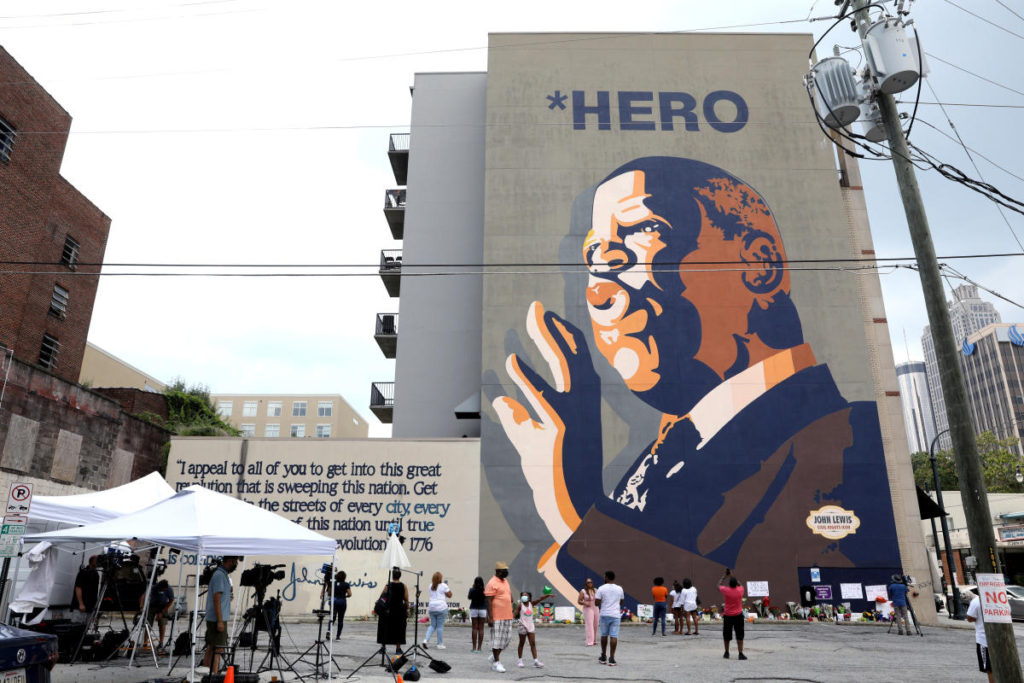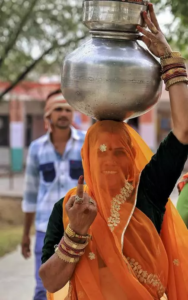✫✫✫
Together, You Can Redeem the Soul of Our Nation
John Lewis
[John Lewis, the iconic US civil rights leader who died on July 17, wrote this essay shortly before his death, to be published upon the day of his funeral.]
While my time here has now come to an end, I want you to know that in the last days and hours of my life you inspired me. You filled me with hope about the next chapter of the great American story when you used your power to make a difference in our society. Millions of people motivated simply by human compassion laid down the burdens of division. Around the country and the world you set aside race, class, age, language and nationality to demand respect for human dignity.
That is why I had to visit Black Lives Matter Plaza in Washington, though I was admitted to the hospital the following day. I just had to see and feel it for myself that, after many years of silent witness, the truth is still marching on.
Emmett Till was my George Floyd. He was my Rayshard Brooks, Sandra Bland and Breonna Taylor. He was 14 when he was killed, and I was only 15 years old at the time. I will never ever forget the moment when it became so clear that he could easily have been me. In those days, fear constrained us like an imaginary prison, and troubling thoughts of potential brutality committed for no understandable reason were the bars.
Though I was surrounded by two loving parents, plenty of brothers, sisters and cousins, their love could not protect me from the unholy oppression waiting just outside that family circle. Unchecked, unrestrained violence and government-sanctioned terror had the power to turn a simple stroll to the store for some Skittles or an innocent morning jog down a lonesome country road into a nightmare. If we are to survive as one unified nation, we must discover what so readily takes root in our hearts that could rob Mother Emanuel Church in South Carolina of her brightest and best, shoot unwitting concertgoers in Las Vegas and choke to death the hopes and dreams of a gifted violinist like Elijah McClain.Like so many young people today, I was searching for a way out, or some might say a way in, and then I heard the voice of Dr. Martin Luther King Jr. on an old radio. He was talking about the philosophy and discipline of nonviolence. He said we are all complicit when we tolerate injustice. He said it is not enough to say it will get better by and by. He said each of us has a moral obligation to stand up, speak up and speak out. When you see something that is not right, you must say something. You must do something. Democracy is not a state. It is an act, and each generation must do its part to help build what we called the Beloved Community, a nation and world society at peace with itself.
Ordinary people with extraordinary vision can redeem the soul of America by getting in what I call good trouble, necessary trouble. Voting and participating in the democratic process are key. The vote is the most powerful nonviolent change agent you have in a democratic society. You must use it because it is not guaranteed. You can lose it.
You must also study and learn the lessons of history because humanity has been involved in this soul-wrenching, existential struggle for a very long time. People on every continent have stood in your shoes, through decades and centuries before you. The truth does not change, and that is why the answers worked out long ago can help you find solutions to the challenges of our time. Continue to build union between movements stretching across the globe because we must put away our willingness to profit from the exploitation of others.
Though I may not be here with you, I urge you to answer the highest calling of your heart and stand up for what you truly believe. In my life I have done all I can to demonstrate that the way of peace, the way of love and nonviolence is the more excellent way. Now it is your turn to let freedom ring.
When historians pick up their pens to write the story of the 21st century, let them say that it was your generation who laid down the heavy burdens of hate at last and that peace finally triumphed over violence, aggression and war. So I say to you, walk with the wind, brothers and sisters, and let the spirit of peace and the power of everlasting love be your guide.
✫✫✫
When John Lewis Left Us
Jesse Jackson
When John Lewis left us, editorials and columns paid tribute to his leadership, his courage, his moral example. The praise was well deserved. A broader context helps understand his true contribution.
John Lewis was born one of 10 children of a sharecropper in Troy, Alabama. He should be remembered now as one of the founding fathers of American democracy. When he led that famous march across the Edmund Pettus Bridge in Selma, Alabama, in 1965, America was not yet a full democracy.
Yes, a brutal civil war had been fought to end the scourge of slavery. Nearly a century later, the Supreme Court ruled in Brown v. Board that segregation — legal apartheid — was a violation of the Constitution. Yet, in 1965, Blacks still had no right to vote. Their efforts to register and vote were routinely suppressed, often violently throughout the South. The same was true for Latinos, for Asian Americans. Young people could serve in the military but had no right to vote.
At Selma, John Lewis walked with amazing courage into mounted police blocking the way. He was beaten badly in the police riot that followed, fearing for his very life. That scene outraged a nation. Two weeks later, Lyndon Johnson pledged that “We shall overcome” and introduced what became the Voting Rights Act of 1965 into Congress. That Act outlawed discrimination in the right to vote by race, color, or language minority status. After that Act, young people received the right to vote. Women’s rights were expanded. Full American democracy was born.
John Lewis was a true hero, but he did not act alone. As he would always teach, he found his place in the civil rights movement that had been building when he was a young child. Thurgood Marshall spearheaded the legal strategy that ended with the Brown decision in the Supreme Court. Rosa Parks sat on that bus in Montgomery, Alabama, and was arrested for ignoring white-only rules. Her courage and sacrifice drew Dr. Martin Luther King to the struggle in Montgomery. King’s organizing drew the attention of a young John Lewis in Troy, Alabama.
John Lewis was a leader, but he was more workhorse than show horse. Show horses preen to win the blue ribbon and the applause of the crowd. Workhorses pull the wagon — and get the job done. John Lewis with his quiet courage and his forceful moral vision pulled people with him. Elected to Congress, he put the Congress on his shoulders and tried by example and by organizing to make it better.
He never stopped. He took joy in how far we had come. There was a direct line from that horrible Bloody Sunday in Selma to the election of an African American president. Yet he knew we still have a long way to go.
No longer do we face separate and unequal public facilities. Our right to vote is clear, even if efforts to suppress it continue. But the final chapter of the civil rights movement — the effort to achieve economic justice — has been frustrated. Today economic inequality is as great as it was 60 years ago. We witness the structural racism that ends with African Americans three times more likely than whites to be infected by the pandemic and two times more likely to die. We witness the entrenched discrimination that ends in the police killing of George Floyd and many others.
That’s why the extraordinary, unprecedented outpouring of protests for Black lives is so important. John has left us, but millions have picked up the baton that he once carried — focused now on equal justice under the law, and on ending the structural racism that makes racial inequality a pre-existing condition. May John’s example — his courage, his devotion of nonviolence and to a lifetime of making “good trouble” — help inform that struggle as it goes forward.
The democracy of 1787, where only white male landowners could vote, referencing Blacks as three-fifths human, without regard for working class whites and women, was very incomplete — it has no export value in the world today. But the democracy of 1965, where Blacks can vote, white women can vote and serve on juries, Latinos and native Americans, 18 year olds, can vote on college campuses, that SELMA democracy is the envy of the world.
Let us cherish it.
(Rev. Jesse Jackson Sr. is is an American civil rights activist, Baptist minister, and politician.)




